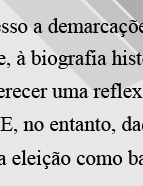

................................
In the early twentieth century, this interest in biography as a genre in its own right is reflected in a series of scattered texts where the biographer or biographical production becomes the object of study: such as in Baptista de Lima, on Garrett's biographer, Gomes de Amorim (1928); in Alfredo Duarte Rodrigues, in the extensive work dedicated to the numerous biographies on the figure of the Marquis of Pombal (1947); in Cruz Malpique, on Teixeira de Pascoais, a biographer (1960); in Alberto Iria, on the Portuguese biographers of Garcia de Orta (1963); and in Saavedra Machado, on José Leite de Vasconcelos, a prolific writer of biographical notes (1970). However, at least one author attempted more comprehensively to follow its trail, or rather to reconstruct over time what he termed as "affinity" with the biographical genre: from António Feliciano de Castilho, Latino Coelho, Rebelo da Silva, and Oliveira Martins to Gomes de Amorim, Rodrigues Cordeiro, Visconde de Sanches de Baena, and Alberto Pimentel. A tireless practitioner of the biographical genre himself, although primarily a disseminator and therefore detached from the academic circuit, Mário Gonçalves Viana perhaps best understood its potential in the field of (historical) biography and reflected on its path. In addition to his intense collaboration with the Estado Novo regime, this writer, teacher and journalist dedicated an extensive text, a combination of study and pamphlet, to the biographical genre, addressing the notion of the great man, serving as a significant introduction to one of the translated volumes of Plutarch's Lives. Convinced of the success of biography among readers of both the past and present, M.G. Viana even called for its status of "science" in his apologia for his ideal model – as indeed Conde de Campo Belo had done some time before, to which he added: "Whoever wished to follow each step in the evolution of this literary genre would be truly surprised by its importance and scope" (M.G. Viana, “Ensaio preambular”, max. pp.34, 46; Campo Belo, op. cit., p.7).
